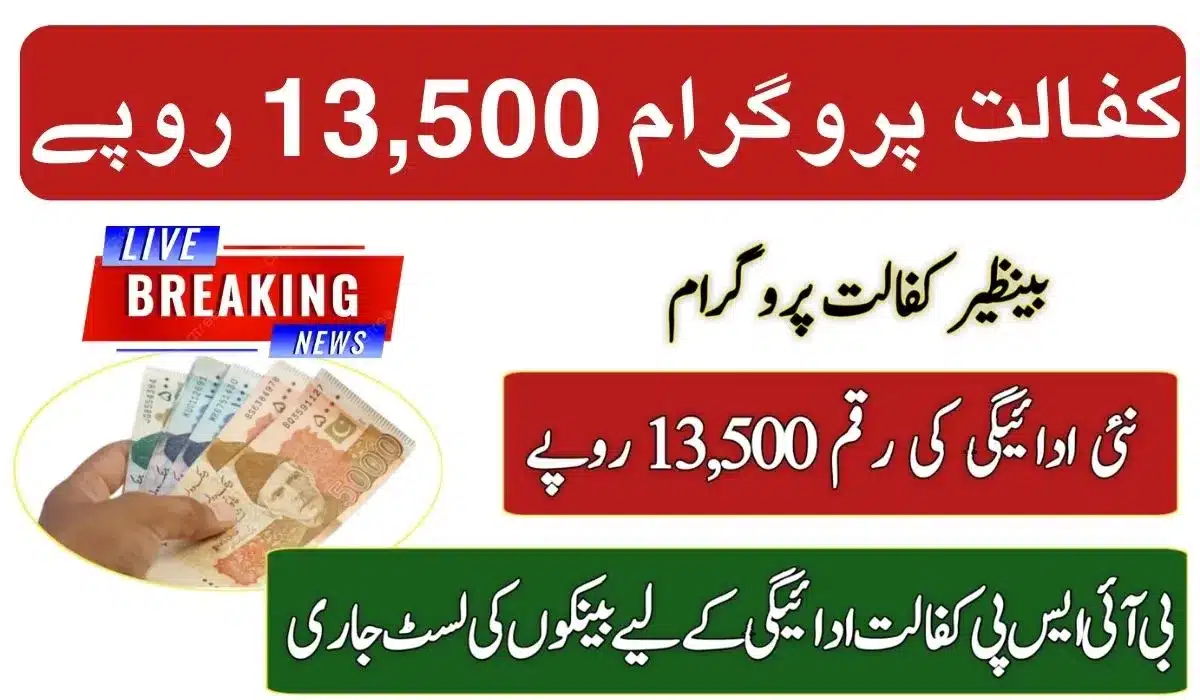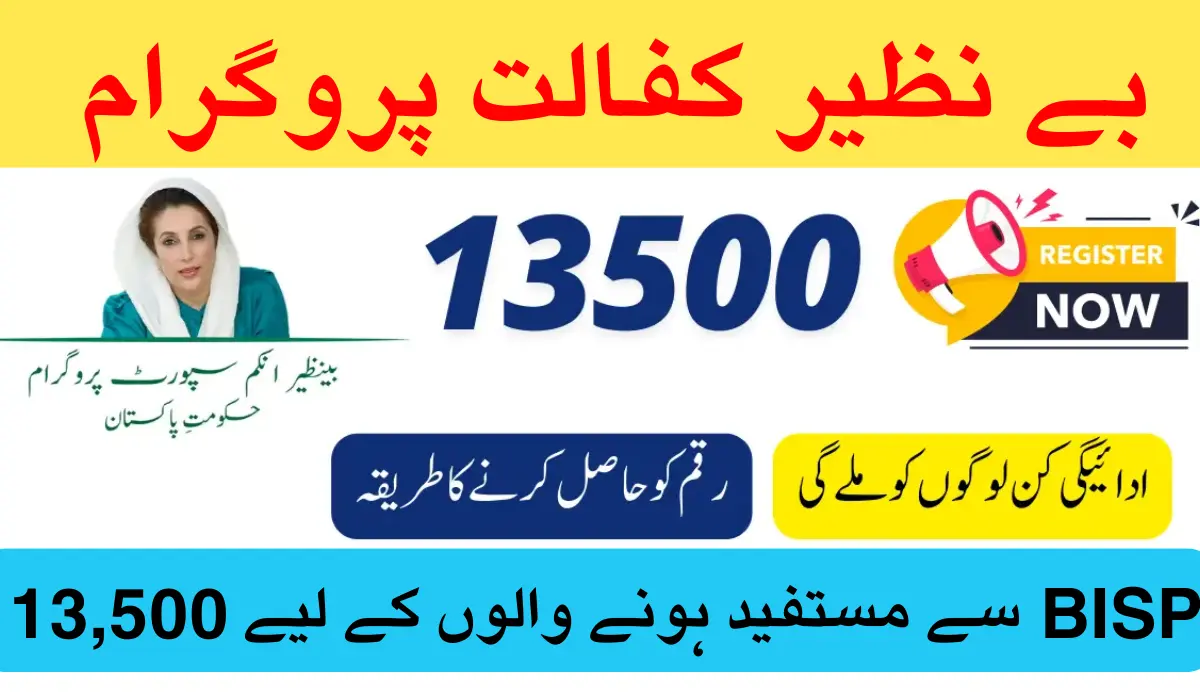IMF Approves Increase In Benazir Kafalat Program
Good news for all registered beneficiaries of the 8171 Benazir Kafalat Program: the IMF has approved an increase in the program’s quarterly payments, raising the amount from Rs 10,500 to Rs 13,500. This represents a 28.6% increase in the Kafalat payments for the new BISP installments. Additionally, the BISP NSER Survey is still ongoing, allowing any eligible woman who has yet to register to complete the process at their local Tehsil office. To qualify for the newly increased stipend under the Benazir Kafalat Program, eligible women must visit the Tehsil office and submit their financial details.
IMF Okays The Increase Of Rs 13,500
The Benazir Kafalat Program has received approval from the International Monetary Fund (IMF) for a notable increase in its stipend levels. Starting in January, participants currently receiving Rs. 10,500 will see their quarterly stipend rise by Rs. 3,000, bringing the total to Rs. 13,500. This increase marks a significant milestone for the BISP, as it aims to further support eligible households, providing financial relief while empowering family members with the skills needed to sustain their livelihoods.
IMF & World Bank Collaboration For Enhancing BISP
The IMF is working with the World Bank to enhance the BISP and its administrative structure. The BISP has a budget of Rs. 599 billion for the current fiscal year, or roughly 0.5% of Pakistan’s GDP. It’s a 27% increase over the same period last year.The BISP program’s primary goals are to guarantee openness in their payment system and to keep an eye on whether or not everyone is getting their payments in a respectful manner. Rubina Khalid claims that they are not receiving any favors from the BISP team management; rather, their rights are being distributed through them.
IMF Unveil New Loan Conditions For Pakistan
Quick Table Details
| Category | Current | Proposed | Change |
| Monthly stipend per household | Rs5,500 | Rs7,000 | 28.6% |
| Number of beneficiaries | 9 million | 12 million | 33.3% |
FAQs
1. What is the Benazir Kafalat Program?
The Benazir Kafalat Program is a social safety net initiative in Pakistan that provides unconditional cash transfers to the country’s poorest and most vulnerable households. It aims to alleviate poverty and inequality by supporting low-income families. The program is named in honor of the late Pakistani Prime Minister, Benazir Bhutto.
2. What is the objective of the Benazir Kafalat Program?
The primary objective of the Benazir Kafalat Program is to provide financial assistance to those in need, reducing poverty and inequality across Pakistan. Additionally, it aims to improve the health and education of children within these beneficiary households, further contributing to long-term social and economic well-being.
3. How many beneficiaries does the Benazir Kafalat Program currently serve?
The program currently benefits around 9 million households across Pakistan. The recent updates may expand this number to 12 million households, reflecting a 33.3% increase in coverage.
4. What is the current stipend provided under the Benazir Kafalat Program?
As of now, the Benazir Kafalat Program provides a quarterly stipend of Rs. 10,500 per household. This amount will be raised to Rs. 13,500 starting in January 2025.
5. What does the IMF’s approval of the stipend increase mean?
The IMF’s approval signals a 28.6% increase in the Benazir Kafalat Program’s stipends, which will enable the program to reach even more households. The increase will help uplift millions of vulnerable families, reduce poverty, and bridge inequality in Pakistan. It reflects international confidence in the program’s efficacy and potential for social development.
6. When will the increase in the Benazir Kafalat Program stipends take effect?
The stipend increase is expected to come into effect in January 2025. All registered beneficiaries will receive Rs. 13,500 per quarter instead of the current Rs. 10,500.
7. How will the increased stipend be funded?
The additional funding required to raise the stipend amount will be met through a combination of international aid, including support from organizations such as the IMF and World Bank, and domestic funding sources.
8. What are the expected benefits of the stipend increase?
The increase in stipends under the Benazir Kafalat Program is anticipated to yield several benefits, including:
- Reduced poverty and inequality: More households will gain access to financial support, improving their quality of life.
- Improved child health and education: Beneficiaries will have more resources to invest in their children’s well-being and education.
- Increased economic activity: The program will help stimulate local economies by providing families with additional spending power.
- Social stability: With better financial stability, families are less likely to face severe hardships, potentially reducing social unrest.
9. Can new participants still register for the Benazir Kafalat Program?
Yes, the BISP NSER Survey is still ongoing, and eligible women who have not yet registered can visit their local Tehsil offices to submit their financial information and complete the registration process.
Conclusion
The recent approval by the International Monetary Fund (IMF) of a 28.6% increase in the Benazir Kafalat Program’s stipend is a significant milestone for Pakistan’s social safety net initiative. This increase, raising the quarterly payments from Rs. 10,500 to Rs. 13,500, will offer much-needed financial support to impoverished and vulnerable households. With this hike, eligible women will enjoy enhanced financial stability, further empowering them to improve their family’s well-being. For those who have yet to register, the BISP NSER Survey continues, allowing them to complete their registration at local Tehsil offices. This increase in stipends is expected to have a widespread positive impact, improving not just individual livelihoods but also contributing to poverty alleviation in Pakistan as a whole.


